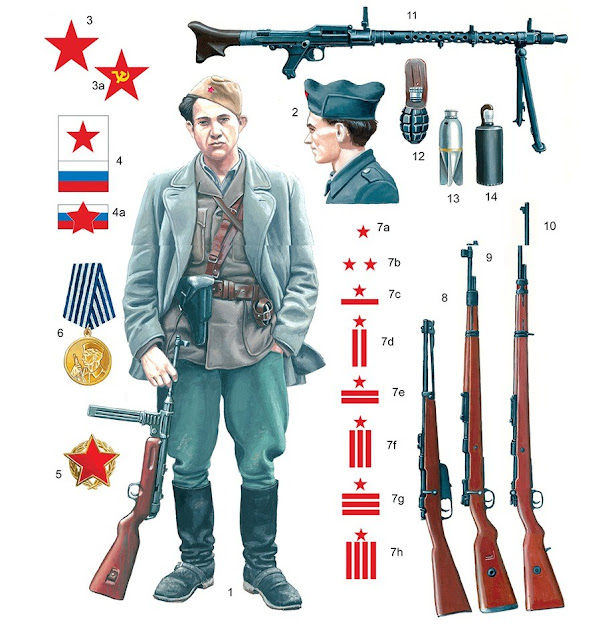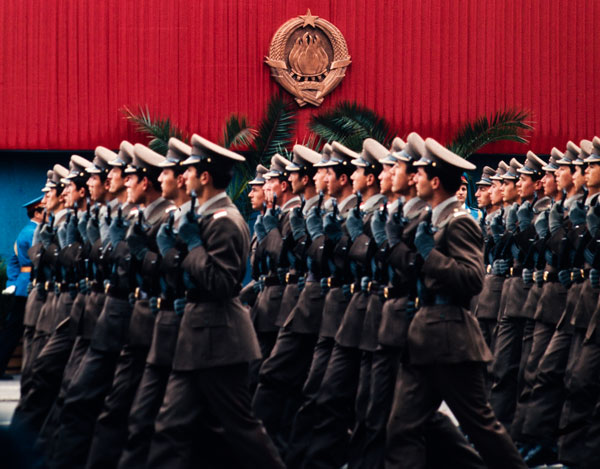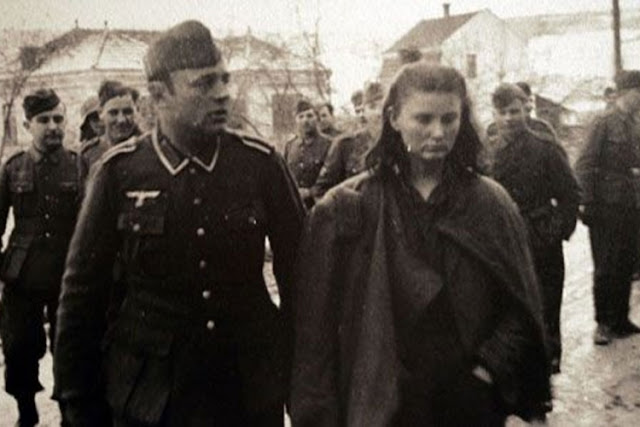The March negotiations - prisoners exchange between the National Liberation Army and Wehrmacht
 |
| A group of fighters of the 2nd Proletarian Brigade with the captured German Major Sterker, during the Fourth Enemy Offensive in 1943. |
The March negotiations were negotiations between representatives of the National Liberation Army of Yugoslavia (NLA) and Wehrmacht on the exchange of prisoners, begun in early March 1943. The Partisans, surrounded by all sides in the midst of The fourth enemy offensive, offered the Germans a ceasefire.
The Partisan-German negotiations were then continued in Sarajevo and Zagreb. Partisan negotiators, the most prominent people of the movement - Milovan Djilas, member of the Politburo, Koca Popovic, commander of the First Proletarian Division and Vladimir Velebit.
 |
| General Koca Popovic, the Commander of the 1st Proletarian Division |
At the end of February or early March 1943, the Partisans captured the German Major Strecker, commander of the 3rd battalion of the 738th peak, and about 25 soldiers. Having been in a difficult position and needing again in time to cross the Neretva, they decided to use it to negotiate with the Germans about the exchange of prisoners, so that at least for a brief moment German pressure would not be allowed. Negotiations began on March 11, 1943, in GornjVakuf.
 |
| After the failure of the attack on Konjic, Supreme Headquarters shall decide on demolishing the bridge over the Neretva and attack in the opposite direction, towards Gornji Vakuf, from 3 to 5 F |
Supreme Commander Tito prepared talks, but he authorized the negotiators to sign in. Chief of Staff of the Supreme Command Velimir Terzic. The Partisan delegation was at its highest level and consisted of: Koča Popović, Commander of the First Proletarian Division, Milovan Đilas (under the pseudonym Miloš Marković), member of the Supreme Command of the NLA and the Politburo, and dr. Vladimir Velebit (under the pseudonym Vladimir Petrovic). The German side was represented by Hans Ott, General der Infanterie Edmund Glaise von Horstenau and partly by General Benignus Dippold from the 717th Infantry division of the Wehrmacht and Hitler's Youth representative.
In a written statement, Partisan delegates indicated which people are offering and who they want to receive in exchange.
 |
| Milovan Đilas was the main Partisan delegate for the negotiations at both Gornji Vakuf and Zagreb. |
Event development
After Partizan counterattack on German positions near Gornji Vakuf on March 3rd and 4th, Major Arthur Strecker, the first high-ranking officer of Vermahta captured by Yugoslav partisans, was captured. Koca in his diary mentions a short-lived truce:
"The Brigade went through a hostile position and ran towards Gracanica in the side and behind the enemy units. Two days led to heavy fighting and decisively influenced the outcome of the fight in the counterattack, near Gornji Vakuf. The day after that there was a truce! "
- War diary of Koca Popovic for March 1943
 |
| The authorization to negotiate with the Germans, that is partisan Supreme Headquarters on 8 March 1943 issued Koca Popovic, commander of the 1st Proletarian Division. |
After the counterattack at Gornji Vakuf, the National Liberation Army of Yugoslavia came to Neretva. At night 6/7. March 2nd Dalmatian and 2nd Proletarians crossed the river, broke the 2nd Durmitor Chetnik Brigade that held that sector, and established a bridgehead. During the Battle of Neretva, partisans broke the majority of Chetnik forces in eastern Herzegovina.
In the meantime, although some talk about a truce, the fighting with the Germans have not been suspended:
The Battle Group Annacker (encountered) the strong resistance of the enemy. Own losses: 6 Germans killed, 14 wounded (among them Lieutenant Hercog from 5th Company 738th Regiment).
- Report of the German 718th Infantry Division of March 17, 1943
The Battle Group Annacker leads the attack through Medaskovic - Mr. Bijela ... Own losses: 1 German officer (lieutenant Hans Ott from the 9th company 750th regiment), 2 wounded. Croats: 3 wounded, lost 1 armored car.
- Report of the German 718th Infantry Division of March 21, 1943
If there was a local truce with Partisans, it was beyond the knowledge of the higher German instances. In the report of the Southeast Command to the Vermaht Supreme Command of April 1, 1943, the termination of hostilities or truce does not mention a single word. Moreover, the command of the South East expressed confidence that in the case of the landing of the Allies the Partisans and the Chetniks fought against the Germans.
One of the participants, Partizan Commander Koca Popovic, recalling the negotiations says:
"It is true that [because of Hitler's opposition] negotiations are interrupted, but do not distract from the mind that our and their negotiating goals were completely limited. In my opinion, we achieved these goals: we achieved relief at the time when it was most needed to us. On the other hand, the German commanders in Yugoslavia wanted the same for their units: they felt our strength, they sought to alleviate their losses. That's why, despite Hitler's rigid order, they tried to at least temporarily hold the word they gave us in those negotiations.
About a certain "tactical cooperation" Partizan with the Germans by the end of 1943 in his memoirs speaks German special envoy for the Balkans Hermann Neubacher:
 |
| Hermann Neubacher |
"Since the end of 1943, there has been constant contact between the German General Staff in Glaise-Horstenau and the Croatian headquarters of Tito's Partisans in Croatia. The practical outcome of these talks was the exchange of prisoners, and especially the wounded. The exchange took place on several occasions. In 1944, there were times when the Partisans seemed to be a far less dangerous occupier than the Allies, who, if they landed on the Balkans, were probably hard to reconcile with the Communists taking a complete victory. The Partisans then fought on several decisive fronts and found themselves in an unenviable situation. Perhaps, for tactical reasons, they made deals with the Germans, in order to get them on time, but never lost sight of their main goal - the conquest of complete authority in Yugoslavia. Likewise, there is no evidence that Tito seriously understood the conclusion of a treaty with the Germans. This cooperation only served him tactically, at a certain point. In the long run, he reflected on his historical role and legend, and he watched, when he worked with the Germans, not to compromise





Comments
Post a Comment